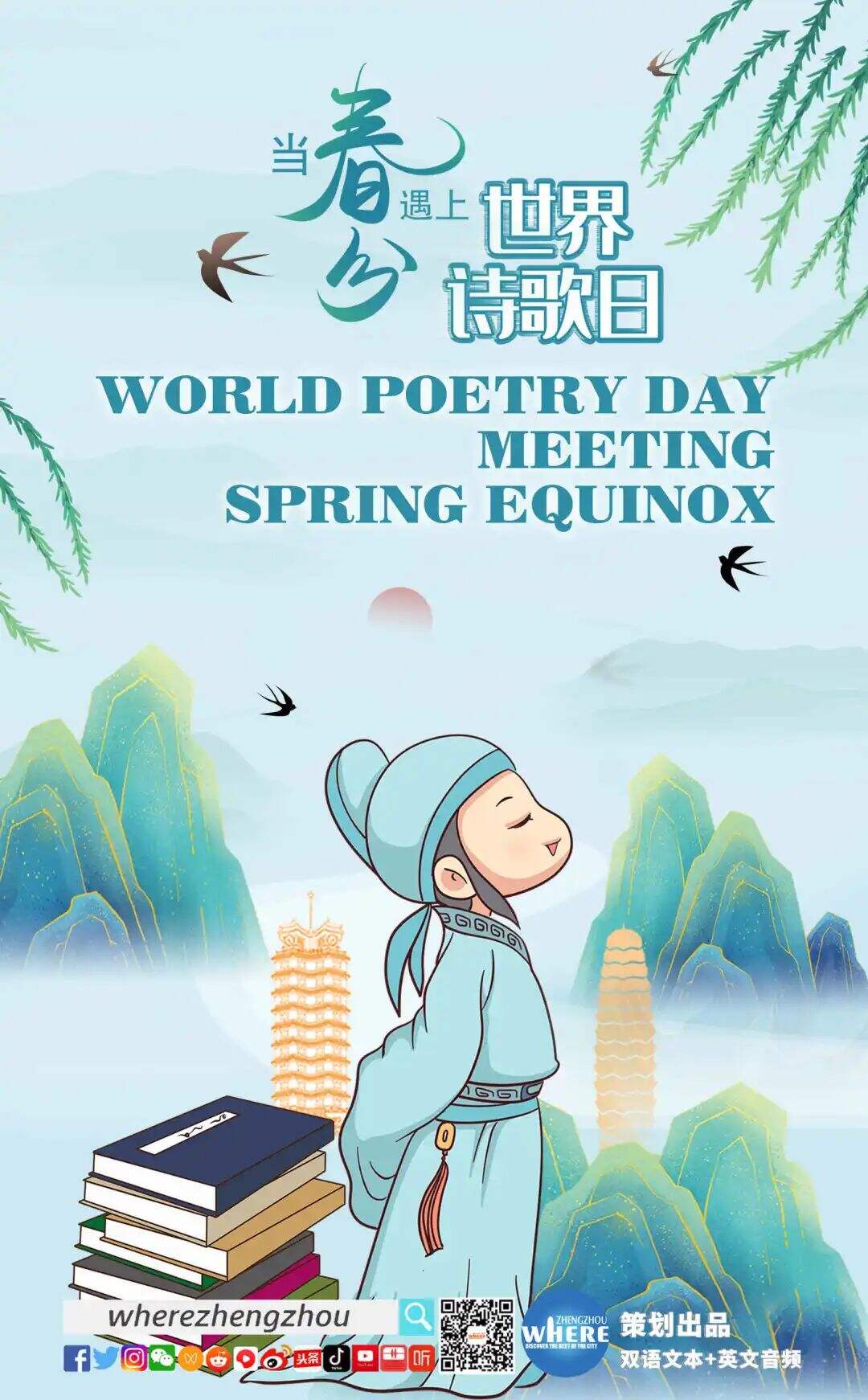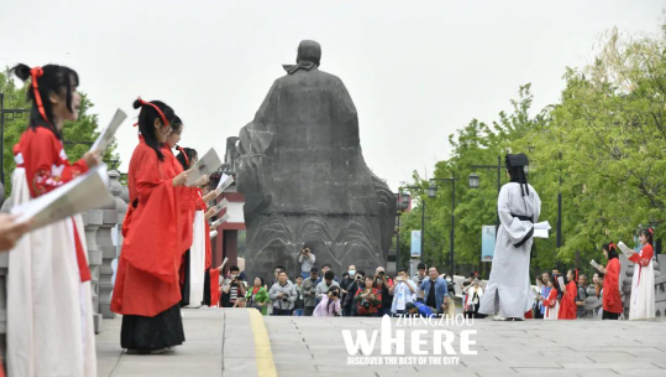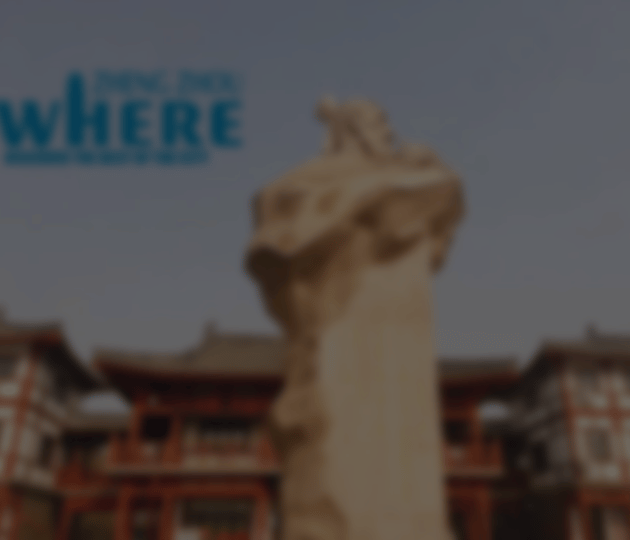

This year, World Poetry Day will fall on the Spring Equinox. In spring, already a romantic and poetic season, World Poetry Day gains additional meaning. Let's celebrate the festival by learning about some great poets from Zhengzhou.
春光如诗,当春分与“世界诗歌日”相遇,春分更将被吟成诗。让我们行走中原,在郑州与中国古代诗歌名家来场浪漫相遇。
A significant part of Chinese culture, poetry has a long history in Zhengzhou. In the Book of Songs, 25 works were composed in Zhengzhou. The profound culture of the Central Plains has cultivated many writers in Zhengzhou, including those great poets in the Tang Dynasty.
诗歌,这一中华文化的瑰宝,在郑州地区有非常悠久的历史,《诗经》中就有25首郑州地区作品,深厚的中原文化底蕴,深刻影响了后世郑州地区的很多文人,使郑州仅在唐代就出现了不少文坛巨匠。
Du Fu, known as the Sage of Poetry, was born in Gongyi, Zhengzhou. He wrote more than 1,500 poems in his lifetime, including many famous verses that have been passed down through the generations. He wrote "Good rain knows its time right. It will fall when comes spring." in Happy Rain on a Spring Night. He said "I will ascend the mountain's crest. It dwarfs all peaks under my feet." in Gazing on Mount Tai. He wrote "The boundless forest sheds its leaves shower by shower. The endless river rolls its waves hour after hour" in On the Height.
“诗圣”杜甫,出生于今天的郑州巩义。他一生写诗一千五百多首,其中很多是传颂千古的名篇名句,如《春夜喜雨》中的“好雨知时节,当春乃发生”;《望岳》中的“会当凌绝顶,一览众山小”;《登高》中的“无边落木萧萧下,不尽长江滚滚来”,皆成为千古绝唱。

Photo: Xu Zongfu
The great poet Bai Juyi was born in Xinzheng, Zhengzhou. His masterpieces like The Song of Everlasting Regret and Pipa Song are widespread. In the sixth year of Emperor Huichang (A.D.846), Bai Juyi wrote the Epitaph of Bai Juyi at the end of his life, in which he emphasized his hometown Xinzheng: On the twentieth day of the first lunar month of the seventh year of Emperor Dali, I was born in Dongguo House, Xinzheng County, Zhengzhou.
大诗人白居易出生于郑州新郑,有“诗魔”和“诗王”之称,代表作《长恨歌》和《琵琶行》广为流传。会昌六年(846年),在生命的最后时刻,白居易写下了《醉吟先生墓志铭》,仍然不忘故乡新郑:“大历七年正月二十日,生于郑州新郑县东郭宅。”
Shortly after Bai Juyi was born in Xinzheng, the famous poet Liu Yuxi was born in Xingyang, a county close to Xinzheng. A famous writer and philosopher in the Tang Dynasty, Liu Yuxi became a close friend of Bai Juyi. He was finally buried in his hometown - Xingyang. Liu Yuxi created a large number of influential works, of which the On My Humble Home and the Song of Bamboo Twigs are well known. Recently, Xingyang has established its first cultural park - Liu Yuxi Park - to pay tribute to this great poet.
大诗人白居易在郑州新郑出生不久,另一位诗人刘禹锡在离他不远的郑州荥阳诞生了。刘禹锡是唐代著名的文学家和哲学家,有“诗豪”之美誉,与白居易是好朋友。刘禹锡死后葬于故乡荥阳。刘禹锡创作了大量佳作,《陋室铭》《竹枝词》等广为传颂。一千多年后,他的家乡郑州荥阳市建立了第一个主题文化公园——刘禹锡公园,表达对刘禹锡的敬意。

Li Shangyin, a famous poet in the late Tang Dynasty, was also born in Xingyang, Zhengzhou. He wrote On the Xiyang Tower, with the line "Vital scenery tends to make people feel infinitely sad. You will see higher towers when climbing up a high tower" being widely known to people.
晚唐著名诗人李商隐,出生于郑州荥阳。他在郑州《夕阳楼》中,留下了著名诗句“花明柳暗绕天愁,上尽重城更上楼”。

Hu Lingneng, a great poet in the Tang Dynasty, was born in Zhongmu County, Zhengzhou. He lived in seclusion in what is modern-day Putian Town in Zhengdong New District. Putian is the hometown of Liezi, a follower of Taoism who was highly respected by Hu Lingneng, who also believed in Taoism. Hu Lingneng's poems tend to show strong interest in life through simple words with deep connotations. One of his masterpieces, A Fishing Boy said "A boy tries to fish with a rod and line, sitting away amid green grass fine. A passer-by waves his hand to ask the way. He won't reply lest fish be scared away". This poem has been included in Chinese textbooks for primary students.
唐朝诗人胡令能,郑州中牟县人,隐居在位于今郑东新区圃田一带。圃田,是列子的家乡。胡令能对列子推崇备至,成就了一副道家风骨。他的诗语言浅显而构思精巧,生活情趣很浓。“蓬头稚子学垂纶,侧坐莓苔草映身。路人借问遥招手,怕得鱼惊不应人。”胡令能的《小儿垂钓》入选小学语文课本,是一首家喻户晓的诗歌。
Zhengzhou, located along the Yellow River in central China, is known for its profound culture. It has cultivated a great number of poets and writers in China's history, who made their era memorialized forever with their literary and artistic talent.
位居天地之中、黄河之滨的郑州,受大河哺育、“天中”滋养,郑州历史上的诗词名人数不胜数,他们用自己的才思为所处时代打上了一片片“高光”。
